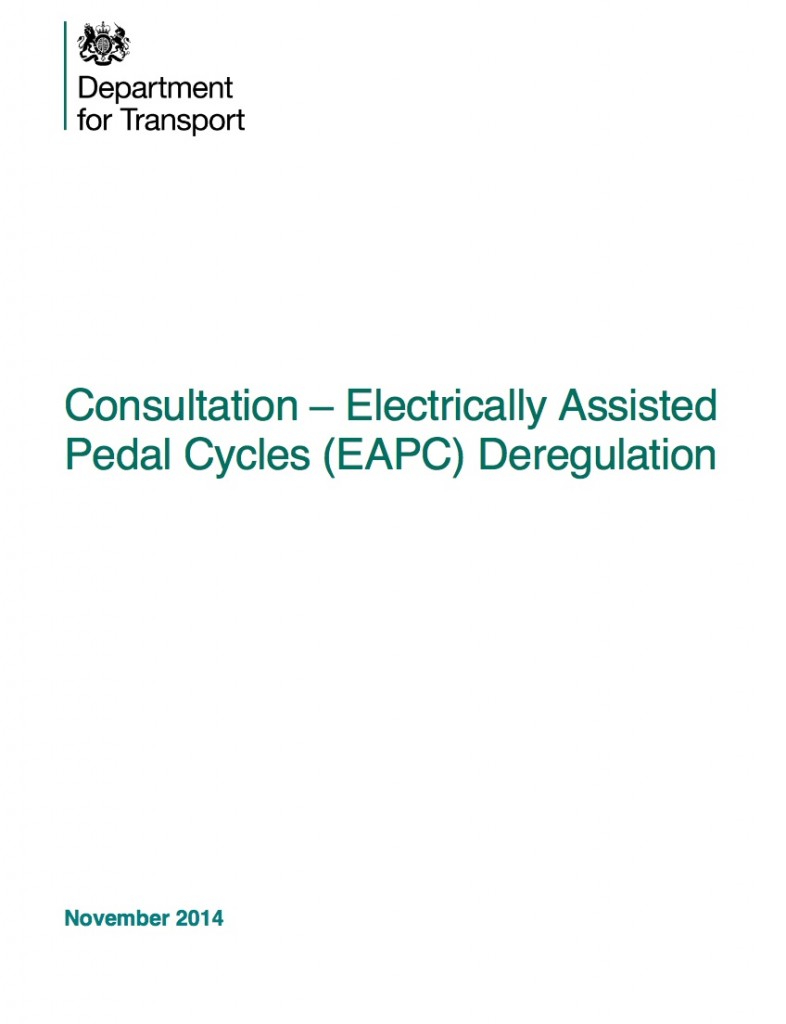The Department for Transport yesterday published a consultation document entitled ‘Electrically Assisted Pedal Cycles (EAPC) Deregulation’ seeking views to its proposed changes to current legislation, which define what constitutes an electric bike for road use in the UK.
The UK’s existing UK electric bike law, the Electrically Assisted Pedal Cycles (EAPC) Regulations, came into force in 1983. Harmonisation with EU law has long been sought by the industry to introduce clarity to areas which have been hazy to say the least; a 200w power output limit in the UK compared to 250w in Europe for instance – but with apparent assurance that UK authorities were not targeting 250w electric bikes ridden on UK roads.
The current EAPC Regulations introduced a classification for electrically assisted pedal cycles that fall outside the rules for motor vehicles when used on UK roads; e-bikes meeting this criteria therefore do not need to be registered, taxed or insured (or helmets compulsory) in the same way as motorbikes and cars.
The current requirements for an e-bike to be classified as an EAPC are:
– The continuous rated power of the motor must not exceed 200 watts for standard bicycles and 250 watts for tandems and tricycles.
– The electrical assistance must cut off when the vehicle reaches 15mph.
– The unladen weight must not exceed 40kg for standard bicycles and 60kg for tandems and tricycles
The draft amendments to this law – and subject to consultation – would change the above to:
– The maximum motor power for standard bicycles is increased to 250 watts. (Maximum rated power will be defined by current European standards.)
– The electric assistance cut off speed is amended to 15.5 mph (to more accurately align with Europe’s 25 km/h).
– All the weight limits are removed.
– Vehicles with more than 3 wheels are permitted.
E-bike marking is recommended by the document as showing the name of the manufacturer, battery voltage and output.
The document sets out that the proposed changes would align the UK’s law with European regulations and standards.
Recognition for elderly and disabled users comes in the form of e-bikes with throttles continuing to be covered by EAPC Regulations – so long as the bike is capable of pedal operation (and fulfils the other EAPC criteria above.)
Also noted in the document is that EAPCs “might” need to comply with The General Product Safety Regulations (2005).
Aligning UK law with Europe would enable manufacturers to produce the same electric bikes for both markets without any question marks over legality when it comes to riding them on British roads.
Currently EU classification does not specify any maximum unladen weight in the way UK law does; the proposed removal of all weight limits opens up the option for delivery businesses to use e-bikes and e-trikes on their rounds.
The full consultation document can be read here.
The consultation period runs until 8th December 2014. Responses should be emailed to eapc.consultation@dft.gsi.gov.uk or posted to:
EAPC Consultation
Department for Transport
1/34 Great Minster House
33 Horseferry Road
London
SW1P 4DR
Respondents should state whether they are responding as an individual or organization (outlining who the organization represents).



